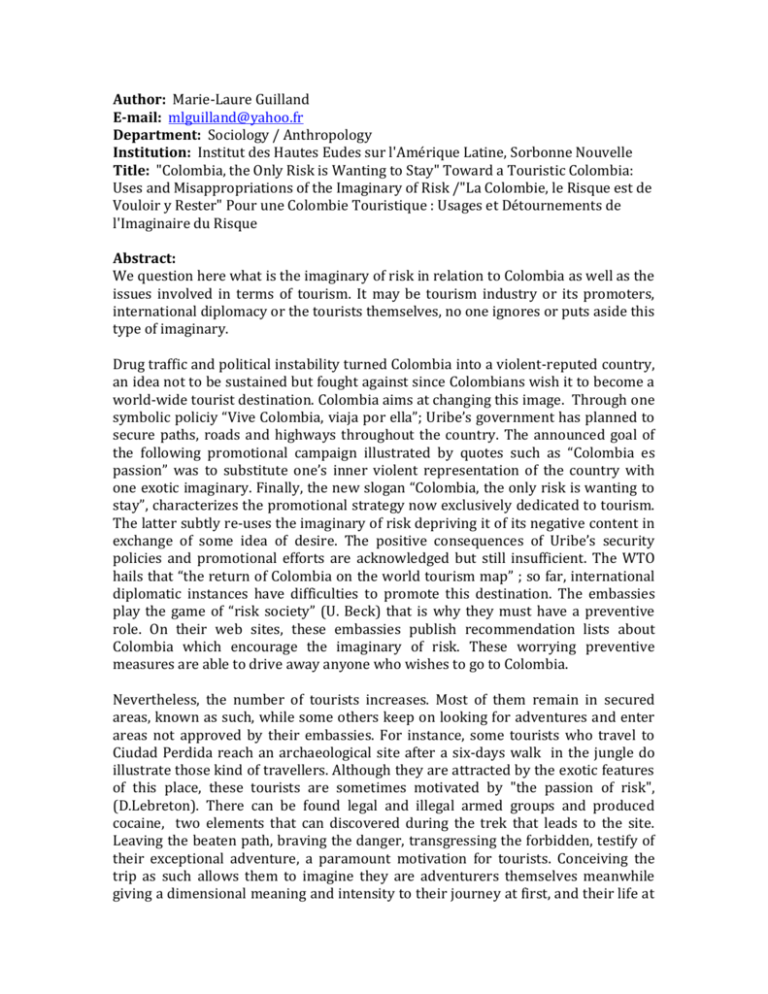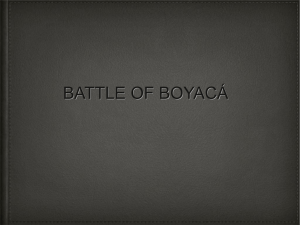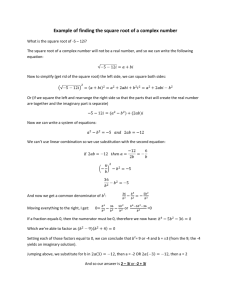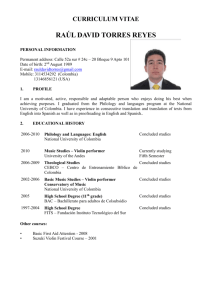Colombia, the only risk is wanting to stay
advertisement

Author: Marie-Laure Guilland E-mail: mlguilland@yahoo.fr Department: Sociology / Anthropology Institution: Institut des Hautes Eudes sur l'Amérique Latine, Sorbonne Nouvelle Title: "Colombia, the Only Risk is Wanting to Stay" Toward a Touristic Colombia: Uses and Misappropriations of the Imaginary of Risk /"La Colombie, le Risque est de Vouloir y Rester" Pour une Colombie Touristique : Usages et Détournements de l'Imaginaire du Risque Abstract: We question here what is the imaginary of risk in relation to Colombia as well as the issues involved in terms of tourism. It may be tourism industry or its promoters, international diplomacy or the tourists themselves, no one ignores or puts aside this type of imaginary. Drug traffic and political instability turned Colombia into a violent-reputed country, an idea not to be sustained but fought against since Colombians wish it to become a world-wide tourist destination. Colombia aims at changing this image. Through one symbolic policiy “Vive Colombia, viaja por ella”; Uribe’s government has planned to secure paths, roads and highways throughout the country. The announced goal of the following promotional campaign illustrated by quotes such as “Colombia es passion” was to substitute one’s inner violent representation of the country with one exotic imaginary. Finally, the new slogan “Colombia, the only risk is wanting to stay”, characterizes the promotional strategy now exclusively dedicated to tourism. The latter subtly re-uses the imaginary of risk depriving it of its negative content in exchange of some idea of desire. The positive consequences of Uribe’s security policies and promotional efforts are acknowledged but still insufficient. The WTO hails that “the return of Colombia on the world tourism map” ; so far, international diplomatic instances have difficulties to promote this destination. The embassies play the game of “risk society” (U. Beck) that is why they must have a preventive role. On their web sites, these embassies publish recommendation lists about Colombia which encourage the imaginary of risk. These worrying preventive measures are able to drive away anyone who wishes to go to Colombia. Nevertheless, the number of tourists increases. Most of them remain in secured areas, known as such, while some others keep on looking for adventures and enter areas not approved by their embassies. For instance, some tourists who travel to Ciudad Perdida reach an archaeological site after a six-days walk in the jungle do illustrate those kind of travellers. Although they are attracted by the exotic features of this place, these tourists are sometimes motivated by "the passion of risk", (D.Lebreton). There can be found legal and illegal armed groups and produced cocaine, two elements that can discovered during the trek that leads to the site. Leaving the beaten path, braving the danger, transgressing the forbidden, testify of their exceptional adventure, a paramount motivation for tourists. Conceiving the trip as such allows them to imagine they are adventurers themselves meanwhile giving a dimensional meaning and intensity to their journey at first, and their life at last. By going to C P, is the risk real, or not? It does not matter. What is important is that the imaginary of risk must be shared, a process that distinguishes oneself for one other tourist on the way back home, while they disseminate and maintain the said imaginary. Author Bio (French): Marie Laure Guilland est doctorante en socio-anthropologie à l'Institut de Hautes Etudes sur l'Amérique Latine (Paris 3 Sorbonne Nouvelle). Elle s'intéresse aux conflits de valeurs engendrés par la mise en tourisme du patrimoine colombien. A travers ce processus ce sont plus largement les enjeux identitaires et politiques de communautés locales et nationales qui sont questionnés. Author Bio (English): Marie Laure Guilland is a PhD candidate in Socio-Anthropology at the l'Institut de Hautes Etudes sur l'Amérique Latine (Paris 3 Sorbonne Nouvelle). She explores the social dynamics through the conflicts of values generated by heritage process and development of tourism in Colombia. These analyses provide to wonder about the identity politic of local and national communities.




